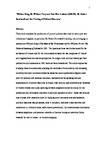William King, Sir William Petty, and Post-War Ireland (1690–92): Sir Robert Southwell and the Printing of Political Discourse
| dc.contributor.author | Hinds, Peter | |
| dc.date.accessioned | 2018-06-12T13:21:05Z | |
| dc.date.issued | 2019-12-01 | |
| dc.identifier.issn | 0024-2160 | |
| dc.identifier.issn | 1744-8581 | |
| dc.identifier.uri | http://hdl.handle.net/10026.1/11650 | |
| dc.description.abstract |
This article analyses the production of printed political discourse between post-war Ireland and England, in particular Sir Robert Southwell’s leading role in bringing to publication William King’s The State of the Protestants and Sir William Petty’s The Political Anatomy of Ireland in 1691. The questions these two books raised for the settlement of Ireland and for the relationship between the two kingdoms of Ireland and England have become very important for Anglo-Irish political history yet their publication circumstances in 1691 have not been considered. The article argues that studying these circumstances, applying the methods of book history, and analysing carefully reception contexts reveals the ways that senior government figures used print for political and personal influence, demonstrates the growing role and sophistication of printed discourse in Anglo-Irish politics, and uncovers how networks of trusted friends and allies operating between kingdoms could be crucial for the production and favourable reception of political argument in print. These two detailed case studies offer new directions for thinking about precisely how and by whom political discourse was generated, how it circulated, and how it was received and understood in turbulent times, with church government, the constitutional relationship between kingdoms, and personal interests in flux and facing an uncertain future, towards the end of James II’s Ireland campaign. | |
| dc.format.extent | 475-500 | |
| dc.language | en | |
| dc.language.iso | en | |
| dc.publisher | Oxford University Press (OUP) | |
| dc.subject | 16 Peace, Justice and Strong Institutions | |
| dc.title | William King, Sir William Petty, and Post-War Ireland (1690–92): Sir Robert Southwell and the Printing of Political Discourse | |
| dc.type | journal-article | |
| plymouth.issue | 4 | |
| plymouth.volume | 20 | |
| plymouth.publication-status | Published | |
| plymouth.journal | The Library | |
| dc.identifier.doi | 10.1093/library/20.4.475 | |
| plymouth.organisational-group | /Plymouth | |
| plymouth.organisational-group | /Plymouth/Faculty of Arts, Humanities and Business | |
| plymouth.organisational-group | /Plymouth/Faculty of Arts, Humanities and Business/School of Society and Culture | |
| plymouth.organisational-group | /Plymouth/REF 2021 Researchers by UoA | |
| plymouth.organisational-group | /Plymouth/REF 2021 Researchers by UoA/UoA27 English Language and Literature | |
| plymouth.organisational-group | /Plymouth/Users by role | |
| plymouth.organisational-group | /Plymouth/Users by role/Academics | |
| dcterms.dateAccepted | 2018-04-03 | |
| dc.rights.embargodate | 2020-1-18 | |
| dc.identifier.eissn | 1744-8581 | |
| dc.rights.embargoperiod | Not known | |
| rioxxterms.versionofrecord | 10.1093/library/20.4.475 | |
| rioxxterms.licenseref.uri | http://www.rioxx.net/licenses/all-rights-reserved | |
| rioxxterms.type | Journal Article/Review |


